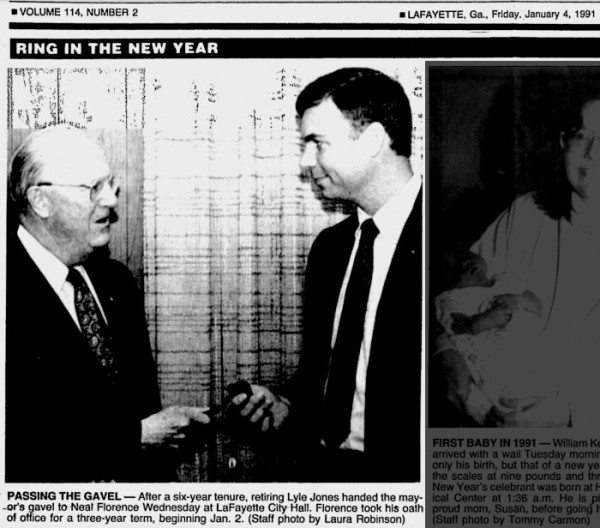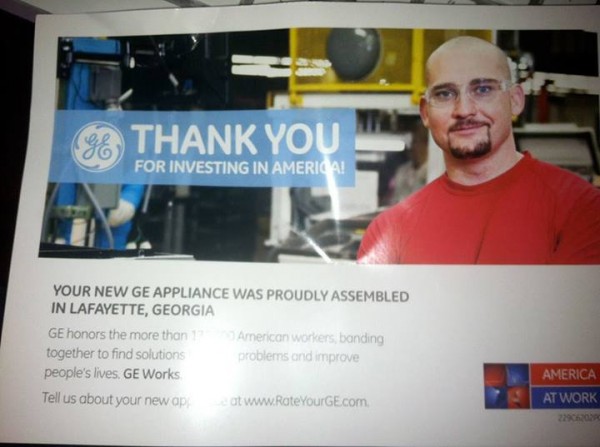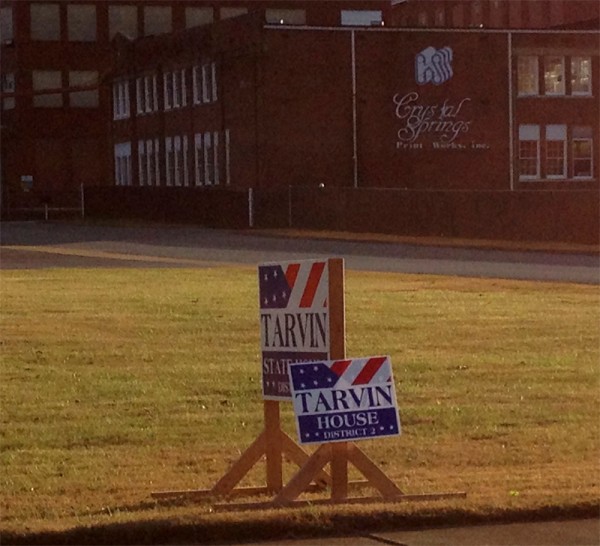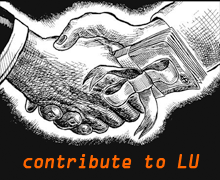02.03
Last month this publication featured a Q&A session between three candidates vying to replace Jay Neal as Representative for Georgia House District 2: Doug Woodruff, Steve Tarvin, and Neal Florence. At the time Tarvin did not respond to questions and was excluded.
Tarvin and Florence were the top finishers on January 7th, but a runoff election was required since neither received over 50% of votes cast. That runoff will be held this Tuesday, February 4th.
 Candidate Tarvin never received his initial Q&A questions because they were sent to an older, unchecked e-mail address. He requested a second chance and was sent the same Q&A as before, which Woodruff and Florence had already answered. After about two weeks he sent in the responses given below.
Candidate Tarvin never received his initial Q&A questions because they were sent to an older, unchecked e-mail address. He requested a second chance and was sent the same Q&A as before, which Woodruff and Florence had already answered. After about two weeks he sent in the responses given below.
Tarvin’s answers (along with Florence’s earlier replies) are shared here so voters can go to the polls Tuesday with the most information possible. But while reading, keep in mind Tarvin had the benefit of more time to answer and could read the answers provided by his opponents before submitting his own. (Woodruff answers are not included since Woodruff is not a candidate for the runoff.)
![]()
LU: What is your full name, and what name do you generally go by?
Florence: Harold Neal Florence Jr
Tarvin: Thomas Stephen Tarvin “Steve”
LU: What is your age?
Florence: 62 yrs.
Tarvin: 62
LU: What is your home address?
Florence: Inside the city of LaFayette
Tarvin: [redacted] W 12th St Chickamauga, Ga
LU: How can voters contact you or stay in touch with your campaign? (Please include info like e-mail, phone, Facebook, Twitter, Web site, etc. if applicable.)
Florence: Neal@NealFlorence.com
www.NealFlorence.com
www.Facebook.com/NealforGA
cell 423-595-0839
Tarvin: Email: steve@stevetarvin.com
Cell phone: 423-605-7328
FaceBook: Steve Tarvin
Twitter @stevetarvin
Website: www.stevetarvin.com
LU: How long have you lived in the area, and have you lived anywhere else?
Florence: LaFayette, GA since 1977 and before that Trion GA
Tarvin: 62 years
Never lived anywhere else
Florence was born in Cedartown before moving to Trion.
LU: Starting as early as you want, what kind of education do you have?
Florence: High School: MaCallie School in Chattanooga TN graduated 1969, College: Graduated University of GA with BS in Chemistry 1973, and BS in Pharmacy 1976
Tarvin: 1st -12th Grade
High School Graduate
LU: What jobs or previous elected positions have you held?
Florence: Mayor of LaFayette since 1990
Owner and Pharmacist at Medi Thrift Pharmacy since 1978
Tarvin: Employed at Crystal Springs 44 years
Chickamauga City School Board
Chickamauga City Council
Florence also serves as a board member for the Bank of LaFayette and worked for a while at Rhyne Bros Pharmacy in LaFayette before starting his own business. He was elected mayor in 1990 but took the oath in January 1991, serving until December 2013.
Tarvin previously ran for US congress in 2010 (losing to Tom Graves) and ran against Jay Neal for this house district in 2012. He’s also on the board of Walker County Habitat for Humanity, a failing charity which has only built six houses in fifteen years and lost its IRS nonprofit status last fall due to not filing required financial reports. He was recently CEO and co-owner of Crystal Springs, a business which closed down at the end of 2013.
LU (Florence Only): Name five specific things you accomplished during 23 years as Mayor of Lafayette:
Florence: 1. Created O-1 zoning district to preserve historic houses along North Main Street
2. Removed old Coke building warehouse and created Joe Stock Park. Remodeled Coke plant building and created Public Safety Department.
3. Purchased Caron Spinning Building and moved Public Works, Electric Department and Water and Sewer Department under all one roof.
4. Removed facades from downtown buildings to revel the original skyline.
5. Filled up J Frank Cobb Industrial Park with businesses.
6. Created Health District of East Villanow Street. This created opportunities for doctor offices and more importantly for after-hours emergency services.
As Florence himself points out in a later answer, mayors don’t vote. He may have had a role in negotiations or pushing for some of these accomplishments but the decisions were hardly his alone. Even if he can take sole credit for all six of these five specific things, the list is hardly impressive considering nearly a quarter-century of service.
Neal Florence’s primary responsibilities as mayor have been leading council meetings, appointing people to various city committees, and his roles in groups that chose police chiefs, city managers, and set up city SPLOST lists. LaFayette’s record in those areas is pretty poor.
LU (Tarvin Only): Name five specific things you accomplished during your time on Chickamauga’s city council and school board:
Tarvin: All of this was accomplished due to being a close knit community with citizen involvement
Distributor of TVA power and kept lowest power rates in Northwest Georgia.
Operated the city in the black while having a “0” millage property tax rate.
Lowest water rates in Northwest Georgia.
Lowest garbage pickup rates in Northwest Georgia.
Maintained the safest area to live in Northwest Georgia.
All accomplishments would be a group effort between school board, faculty, administration, community and students.
The system maintained an excellent academic record while having a school millage rate of <63% of other area school systems.
The system maintained one of the lowest cost/student ratios in the state.
The system maintained the high ninety percentile graduation rate.
The system was able to keep high quality professionals throughout.
The system maintained a continued excellent safety record.
The City of Chickamauga has an inherent advantage over similar city governments (much less county and state government) by making most of its money from the sale of utilities to residents. That city has been more successful financially in that area than LaFayette by having fewer residents to serve but more industries which buy city electricity.
Likewise, Chickamaua Schools have an advantage by serving a tiny population with a large industrial tax base AND only serving students who live inside city limits. Being able to exclude children from outside the city, whose family backgrounds make them less likely to do well in class, and not having to provide transportation on a daily basis both save the system money AND make it more likely to perform well compared to surrounding school districts. Tarvin’s success in this area would be hard to duplicate county-wide or state-wide.
The lowest water and garbage rates were obtained through shenanigans with County leadership, charging Chickamauga residents less for water and use of the garbage dump than other county residents pay.
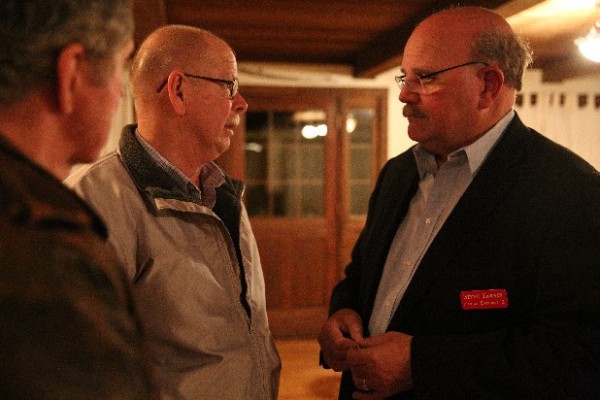
LU: What will your education and experiences contribute to make you a better State Representative?
Florence: They will allow me to make logical and appreciate decisions
My experience as a healthcare professional, business owner, mayor and pharmacy legislative committee member, give me an understanding of the entire legislative process, as well as a working relationship with current legislators. Recently, I worked with the Georgia Pharmacy Association and the Georgia Legislature to pass regulations allowing pharmacists to give immunizations under doctor protocol. The thousands of people who got flu shots at pharmacies without needing a doctor’s visit can appreciate my approach to practical legislation that can be implemented promptly and efficiently.
Tarvin: I think the following make me the best choice and the best fit for the people of District 2
1) 40 years of experience negotiating with the various government agencies such as OSHA, EEOC, EPD and many others both state and federal.
2) Experience in the day to day management of a multi-million dollar company for over thirty years and witnessing the effect government intrusion is having on Georgia businesses today;
3) My being on the “paying” end of millions of dollars in health insurance premiums and witnessing what has caused healthcare costs to skyrocket.
4) My experiences of being raised on a poultry farm, and my being a cattle and grass farmer as have so many in the area
5) My experience in the home construction business
6) Decades of being considered a fair, honest and ethical business man who is above reproach in business dealings on a national level.
My life is the life of the District 2 citizen.
LU: What are your thoughts on the role of a state legislator? What should a State Representative do, and (also important) what should a State Rep NOT do?
Florence: The main focus of a representative is to be just that, a representative of the people he or she is elected by at the State Capitol. A State Representative should look to reduce government, decrease spending and protect the tax payer’s money.
They should not be looking for ways to increase regulations and codes that are burdensome to business development. Also, they should not pass mandates to cities that are not funded.
A State Representative, or candidate for that matter, should not be running to serve themselves, or to advance their own political ambition.
Tarvin: A State Legislator should always honor the U.S. and Georgia Constitution, and look for every way possible to lower the cost of operating our state (it can be reduced), this in turn prevents future tax increases from occurring. Always know how any new programs will be paid for, look ahead to what some of the unintended consequences could possibly be and insure that any and all new programs and laws are absolutely necessary. In short remember that it is the citizen’s money that is being spent; and fewer laws and less government intrusion into the lives of Georgians is preferred. Less government is a good thing.
We don’t need more laws and regulations, we should never take away local control and a legislator should strive to prevent more bureaucracy on a state and federal level.

LU: What would you say is the greatest accomplishment of Georgia’s current legislative body?
Florence: Passing a constitutional amendment requiring a balanced budget every year. If the Federal Government would follow this example we could begin the long process of turning our nation around.
Tarvin: no answer
LU: What would you say is the biggest failure of the sitting legislature?
Florence: Ethics, unfortunately Georgia doesn’t rank to well in Ethics and the current laws on the books don’t do enough to provide for an open and transparent state government. While we did limit gifts to elected officials, we have left the Ethics Commission itself in utter disarray and without any enforcement powers. We cannot ignore this.
Tarvin: While I think the legislators are honest as a whole, with all of the accusations flying around the Capitol they should have gone overboard to show that fact with more transparency and openness.
Mayor Florence’s choice of ethics as the biggest failure echoes the thoughts of many in his district. Tarvin doesn’t seem to see the serious ethical issues others observe, but he is right to point out lack of transparency in the ethics process. The state needs stronger ethics laws AND independent agencies that can enforce them, with teeth.
LU: What will be your first action once sworn in as a member of the General Assembly?
Florence: I will immediately seek out those with more legislative experience and seek their counsel and advice. I have much to learn and look forward to strengthening my relationships down at the Capitol so that I can most effectively serve the citizens of HD2.
Tarvin: Learn where I am expected to sit and start trying to find and form a coalition of small government, like minded constituents and begin reining in a way too big state government.
I will immediately try to slow the overreach of the federal government on our citizens and businesses, privacy issues, freedom of speech, push for more local control to improve the education of our youth, continue to strengthen the right to own a weapon for protection of yourself, family and property. No issue is a Federal issue to me if it affects the lives of my children, grandchildren and generations beyond those, all issues are local.
Mayor Florence should be careful in developing too close a relationship with existing legislators; we need these outsiders to remain outsiders even as they try to work with others. Being best friends with everyone else in Atlanta is what turns good men into bad politicians.
Tarvin’s goals are good but a bit light on specifics how he’d do any of that better than those who have come before him and failed.
LU: What are the biggest problems faced today by residents of District 2, and what (if anything) can you do as a state legislator to make those problems easier to overcome?
Florence: Access to good jobs. For our area to improve, our citizens must have access to good quality jobs so that they can provide for their families and invest back in our local community. I’ve run a successful small business and know what it takes to create good jobs. We need to get government out of the way and let the free market work. We also need quality education and excellent public safety. As a servant leader, I will work on these issues during the upcoming legislative session.
Tarvin: Jobs is the number one problem facing North Georgia. See Below
LU: As a State Representative, what will YOU do to strengthen Georgia’s economy and bring business and jobs back into Northwest GA?
Florence: Work to reduce or eliminate the state income tax. Being here in NW GA we know all too well what it’s like to have to compete for Jobs against a state to our north that does not have an income tax. We have to reduce the tax burden on our hard working citizens and businesses. Government doesn’t create jobs, but it can and often does kill jobs by getting in the way. We must tackle this issue.
Tarvin: We must make Georgia a more business friendly environment, eliminating income tax on businesses will bring and keep businesses here. The taxes paid by all businesses is embedded in the price of the product at the retail level and paid by the purchaser, You the “North Georgia Citizens”.
Looks like Florence would eliminate the personal income tax while Tarvin would prefer to end business taxes. We can’t do both and still keep the state open, but one or the other might be doable. Ending personal taxes makes the state more appealing as a place to live, while ending business taxes would make the state more appealing as a place to work. Both would bring people into the area but both have their own distinctive advantages and disadvantages.
LU (Tarvin Only): You recently shut down your 106-year-old textile business, Crystal Springs Print Works, a major employer and tax-payer in Chickamauga. What led up to the closure of this business, and what do you expect to happen to the closed facility next year? Will the Crystal Springs location house another business, will it sit empty, or will we watch it torn down for bricks and parts?
Tarvin: A very weak economy and a business that has gone over seas.
There are several options still on the table, but the most likely is that some of the older building will be torn down and the newer buildings and main office will remain. There are several people looking at the printing equipment and it is likely that the machines will print again in North Georgia.
LU: Rep. Jay Neal’s primary focus in the last few years has been reforming the state’s correctional system – reducing minimum sentences and expanding programs to help criminals reform instead of lingering in prison. Gov. Deal has also made correctional reform one of his priorities for the next term. What are your thoughts on what’s been done in this area so far, and what additional changes would you like to see? What’s the right balance between over-punishing and under-punishing criminals?
Florence: I am pleased with the progress Georgia has made in this area. Locking up non-violent offenders for long periods of time comes at a great cost to the taxpayers. Violent criminals must be punished, but those with addictions in many cases need treatment so that they can be rehabilitated and not remain a burden on society. It is a delicate balance, but we are definitely moving in the right direction.
Tarvin: Our prison systems as many other of our facilities are in bad need of repair, the bad economy has hit every aspect of our state. We must slowly start those repairs as the economy picks up.
The program that Representative Neal has worked on is one of the things which I totally agree with him. We are making life long criminals out of many young first time non-violent offenders.
Nobody wants to see prisons filled to capacity, especially with people who could be reformed and live normal lives outside of prison. But the balance to keeping criminals out of jail is to fully fund programs that address addiction, ignorance, and mental/emotional issues.
Also key: making non-prison reform programs accountable both to the state and their communities so those that don’t work are fixed or closed down. Right now in society, especially in Walker County, judges, courts, and law enforcement are seen as a joke because prison and non-prison punishments both look like a revolving door and sentences seem to be handed out arbitrarily. State-wide, mental health services are practically non-existent.
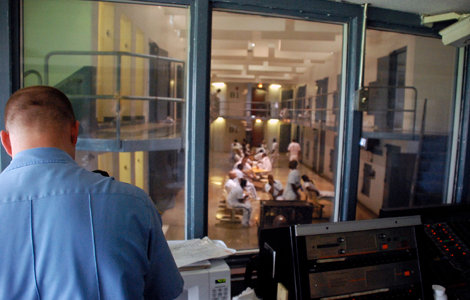
LU: What will you do to address abuse behind bars at GA Department of Juvenile Justice and to fix conditions at Hays Prison which have led to multiple inmate deaths?
Florence: Abuse behind bars and inmate deaths must be fully investigated and those responsible held accountable. I will support all efforts to address these issues and make sure that we are taking adequate care of those we have responsibility for.
Tarvin: We have recently seen Criminal Justice Reform which I think will reduce the overcrowded conditions across the State, this will also have an effect on the Juvenile System. As I mentioned above our prisons are in ill repair, many locking mechanism malfunction and guards are stretched to the limit.
The unfortunate incidents at Hays in late 2012 and early 2013 including 4 murders and multiple stabbings of guards shortly after the murders even during a time of lock down were very disturbing. The situation there is much improved since the changes that were made at that time.
LU: Gun rights and self-defense laws are in a spotlight, both nationally and in Georgia. In the last two months we’ve seen two high-profile cases here in HD2 involving potential robbers (or people seen as robbers) shot down by homeowners. Are the state’s current gun laws appropriate? What are your thoughts on House Bill 100?
Florence: I don’t think Georgia’s gun laws do enough to protect or expand our 2nd Amendment rights. I support House Bill 100 and will do everything I can to make sure the rights of law abiding citizens are not infringed upon.
Tarvin: I support HB 100 due to what we have seen in others states during states of emergency, law abiding citizens should never have the weapons taken from them. I would also like to see Constitutional Carry passed in Georgia (I will sponsor such legislation) I have no comment on the two cases.
Would be nice to know what candidate Florence would do to strengthen the state’s gun laws or what ways the existing laws don’t do enough. Considering their constituency, there’s little risk either candidate would do anything to impede on gun ownership or self defense laws or risk the wrath of gun owners.
For those who don’t want to read it, HB 100 would remove the state’s authority to confiscate or restrict gun ownership during emergency situations.

LU: Many in Walker County are concerned about cuts to school budgets and new insurance rules putting the squeeze on local libraries. What should be done to fund or reform education in Georgia and keep libraries around the state accessible to citizens?
Florence: The state budget is one of the most important responsibilities the State legislature has and as your next State Representative I will take the time and due-diligence to ensure that your tax dollars are spent wisely. The Education portion of the budget is very important and needs in depth scrutiny to better answer this question
Tarvin: Schools should be funded for the full 180 day school year. Cuts should come from areas other than the class room. Some 33% is spent other than the class room level.
You can us my answer from 2 years ago on libraries, virtual libraries are the future.
In order to better fund libraries and schools without raising taxes, something else must be cut OR the funding systems for libraries and schools streamlined. Neither answer here gives enough information – HOW would you do this?
Tarvin’s 2012 answer to a similar question didn’t exactly address virtual libraries: “Is $1700 per capita enough spent on education? Yes, when totaled up we spent about $17B on education in Georgia almost as much as the entire budget, when you ad all monies from fed, state, local and private. The state itself spends about 54% of its budget on education or $1000 per capita. Where was the closest public library to your home in 1960? How many do we have now in Walker County today? We can have any and all things we want, the question to those with concern is, where do we get the money? Start by getting the federal government out of Georgia’s educational system. Education has gone downhill and costs have skyrocketed since the Dept. of Education was created. Local control of our education system and parents taking responsibility to insure that their children are being educated.”
It seems Mr. Tarvin would prefer to shift everything onto the Internet instead of having local libraries available. That may be reading too much into his answer, but if he didn’t want speculation he probably should have provided a clearer response.
Last year Tarvin told the Dalton Daily Citizen he’s a supporter of charter schools – in theory. Florence has not taken a public position on school choice.
LU: One of the most discussed political issues right now is healthcare and new federal health insurance laws. What are your thoughts on Georgia’s role in healthcare, insurance laws, and the expansion of Medicare? What is your position on House Bill 707?
Florence: Due to time limit, unable to answer
Tarvin: From what I have read, I support 707, we should not allow the federal government to force health insurance on our citizens. We must fix Medicare, it is the most difficult of all programs to fix, my mother and mother-in-law depend on Medicare; and Jennifer and I will be on Medicare in two years.
The expansion of Medicare will not cost our citizens anything for the first three years and then the cost to Georgia tax payers will be about $4.5 over ten years. The same problem rears its ugly head, government not letting the free market system work and driving up costs to consumers. If Americans had no health insurance, doctors would only charge what their patients could afford to pay and everyone would still want their children to be doctors. When you place anything between the purchaser and the seller, you drive up costs. The ACA doubles down on this failed policy of intrusion and drives a bigger wedge between you and your doctor.
HB 707 essentially prohibits state agencies, state employees, and contractors doing business with the state from implementing or assisting the implementation of any aspect of the Affordable Care Act, a/k/a ObamaCare.
Florence did not have time to answer the LU Q&A but recently suggested the entire Affordable Care Act could’t be totally dismantled because too many people have signed up for it and depend on it.

LU: Hutcheson Medical Center is located in the heart of House District 2. Since the hospital is owned by a regional committee controlled by three counties, major restructuring of its boards and leadership can only be done at the state level through legislative action. What do you think about the hospital’s current direction, and what (if anything) will you do in Atlanta to change the way HMC is currently run?
Florence: The hospital was created by the three counties. They have control over the boards that oversee the operations of the hospital. As I see it there are three options for the counties.
1. Sell it.
2. Lease it to an agency that is capable of operating hospitals.
3. Allow the local board to operate the hospital and make it profitable.
Tarvin: The hospital is very important to our area, as a citizen of the Tri-County Area I will do any and everything to preserve its existence.
The Tri County area should determine what happens to the hospital. The three counties are very capable via the board they appoint to make the decisions for the hospital. I will not interfere as a legislator.
100% Local Control
While Hutcheson was created by the three counties, county leaders only choose who sits on its boards. Since the Hospital Authority is a regional commission, its structure can only be changed by the state, through legislation. Changes to the HMC board were made last year by Jeff Mullis, John Deffenbaugh, and Jay Neal – future changes will have to be made by Mullis, Deffenbaugh, and whoever wins this House District 2 runoff vote.
Additionally, state law regulates how ALL hospital authorities are structured. A proposed bill from Senator Mullis, SB 302, would force regional hospitals like Hutcheson to undergo regular independent audits, limit the amount of money they can take out in loans without voter approval, and also require county commissioners to directly sit on their boards. That bill will be up for a vote soon and whoever wins this election will have to take a position on it.
The counties have shown themselves absolutely incompetent when it comes to actually running a hospital. Local control doesn’t mean watching a house burn down because you don’t live in the home; if there’s something the state can do to repair what’s wrong at HMC, there should be some willingness to get involved – especially in regards to an essential organization controlled by more than one government entity.
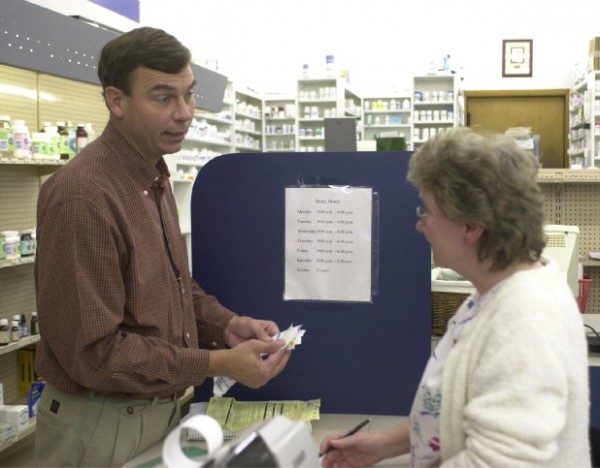
LU (Florence Only): For several years, Lafayette’s employee health insurance plan (approved by the council and mayor) has required city workers to buy prescription drugs through “locally owned” pharmacies. You happen to own one of the few pharmacies in town meeting that odd requirement – can you explain this seeming conflict of interest to voters?
Florence: This insurance plan was recommended by a consultant to go to partial self-insured plan to save the tax payer dollars. Annually the council reviews Employee health insurance plans and the council votes on the best plan for the city. The Mayor does not vote. The city worked together with several local pharmacies to put together a plan that supported local businesses and saved the city money.
The mayor does not vote, as he said. But he does have influence over the city’s decisions and processes – and he owns one of those “local pharmacies” that worked with the city to develop this plan. There is no record of Neal Florence at any point suggesting the advantageous plan not be adopted, even though most city employees hate that part of their insurance coverage because local pharmacies aren’t open on nights or weekends like chain stores.
When asked about this issue by the Times Free Press in 2011, Florence told a reporter “I’ll come after you” if they mentioned the policy being a conflict of interest as LU did previously.
LU: In recent years Georgia has struggled to establish and enforce coherent ethical standards for state legislators and other elected leaders. Budget cuts and accusations of bias at the Ethics Commission (resulting in FBI action), along with accusations of ethical lapses against Governor Deal and Senator Don Balfour, have given the state a black eye. Is Georgia on the right track ethically? What changes, if any, would you propose to state ethics or campaign laws?
Florence: No, Georgia is not. Georgia needs an unbiased, totally independent agency enforcing state ethics and campaign laws.
Tarvin: The state of Georgia has some of the toughest ethic laws in the country, the laws are adequate, they simply must be enforced. We should go overboard with transparency to gain the confidence of the citizens.
I will accept no gifts from a lobbyist, there is no reason for me to do so. Legitimate Campaign Committee Contributions only.
Florence’s answer is on track, but again HOW could this be done?
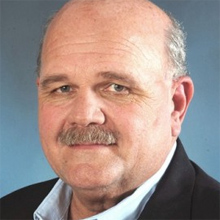 Tarvin is right, again, to focus on transparency but there are issues beyond just transparency – the information gained from being transparent must be used to hold leaders accountable.
Tarvin is right, again, to focus on transparency but there are issues beyond just transparency – the information gained from being transparent must be used to hold leaders accountable.
A personal pledge not to accept lobbyist funds is fine but what about the other 235 state legislators and hundreds of other elected officials at each level of state and local government? Many of them are happy to take any money Tarvin doesn’t accept and do whatever the person behind it requests of them. More needs to be done.
In 2012 Tarvin came out AGAINST strengthening ethics rules, saying, in part: “Elect the right people is the answer not more and more laws to be gone around and dodged.” However, in a recent interview with the Dalton Daily Citizen he said ethics reform is needed: “There needs to be ethics reform. I don’t know why I need to take money from lobbyists if I’m a legislator. I don’t think there’s a reason for it.”
Per state ethics reports, Tarvin has kept his word so far – for the current campaign all his donations have been from private individuals, and all but one gift was from within the district. Likewise, in 2012 most of his campaign funds came from his own bank account. Florence has taken in quite a bit more money, much of it from out-of-district political groups or pharmacies and medical groups.
LU: Ethical problems at the local level are also alarming. In light of recent news reports about judges in Chattooga and Walker taking illegal payments to dismiss minor charges, do you feel local judges and prosecutors are held to the ethical standards they should be? Once elected would you push for laws to hold judges, prosecutors, and member of law enforcement more accountable for their actions?
Florence: All of our elected and appointed officials must be held to a higher standard of ethical and moral accountability. I will support all good public policy that seeks to improve accountability for those in positions of power.
Tarvin: Just as in ethics at the Capitol, the laws are in place for oversight of our judicial system and enforcement agencies are in place to investigate such matters. While I have heard of reduced fine situations and am not sure if that is a problem, I know nothing of judges being paid to reduce fines.
Another answer from Florence that needs more detail. Tarvin apparently doesn’t read the Chattanooga newspaper or read news online – the issue of corrupt judges in Chattooga and Walker has been a front-page story several times in the last few months. And the agencies in place to handle those issues have failed by dismissing charges without punishment. Tarvin’s attitude towards local ethical issues is the problem we have NOW.
LU: What are your thoughts on the state’s current civil forfeiture laws, and do you support reform in that area? Would you have voted for House Bill 1 if you had been in the General Assembly last winter?
Florence: Yes.
Tarvin: If I understand the bill properly.
HB 1 is very far reaching and covers a variety of items, but the changes were concerning the seizing of personal property upon arrest and that person is presumed innocent until found guilty by a group of his/her peers. Then some of the property is lost forever. I think changes need to be made, but law enforcement agencies think that new law could become a loophole for criminals to say they purchased the items legally and did know the products were illegal or counterfeit.
I would have voted “NO” as written. Maybe the seizure laws could be categorized for different situations. Drug manufacturing could carry a stricter seizer rule than say the possession of counterfeit women’s purses.
Currently, anyone suspected of a drug crime or a handful of other offenses can have their assets or cash taken by police or deputies, even if they aren’t convicted or never face charges in court. It’s not “lost forever” after conviction, it’s lost forever after accusation unless the accused can afford an expensive private attorney to argue for them in civil court. Existing law in this area is ripe for abuse and has to be changed to protect citizen rights.
HB 1 WOULD have reformed state laws about forfeiture of assets from people accused of criminal activity, if it hadn’t been shot down by state leaders after a protest from law enforcement agencies. Another version of the bill has been introduced this year, and the winner of this election might have a chance to vote on it.

LU: Georgia is the only state allowing sole-commissioner county government, a system only employed by eight of the state’s 159 counties. Can a sole commissioner adequately represent the needs of fifty thousand or more people, and also remain ethically accountable? As a member of Walker County’s delegation to the General Assembly, would you produce legislation giving Walker County a board of commissioners if citizens request it?
Florence: Local control is key to good public policy. On matters of self-government I will defer to the citizens and support the form of local government that they choose for themselves.
Tarvin: I personally prefer a sole commissioner to a board of commissioners. The people of Walker County at this time do not want a board and prefer a sole commissioner. Many who voted against our current commissioner in the last election do not want a board of commissioners. If the majority of people in Walker County ever want to change to a board of commissioners then I would support it. At this time I can tell you it is very spotty and regionalized.
Two men who have both served in city government, both running for the state legislature, should understand the value of government checks and balances. They wouldn’t support a governor reigning with no legislature or a president who ruled without a congress to keep his power in check – but both seem to be fine with massive counties being run by a single person with almost no accountability. The entire system needs to be abolished state-wide, but we’re once again looking at candidates who aren’t going to venture down that road without a LOT of pushing.
Florence’s response is disappointing, but Tarvin’s comment here is an absolute insult. How does he know what voters think about an issue we haven’t been allowed to vote on in decades? He hasn’t talked to every citizen, every voter, but has the same dismissive attitude to this issue as the current sole Commissioner. He’s a card-carrying Chickamaugan, living in and surrounded by people from a city which has benefitted greatly over the last forty years from the sole commissioner system here.
Someone dedicated to “local control” should do everything in his power to make sure every part of his district has full representative government and a local voice. Right now much of Walker County has NO local control, their voices shut out of the debate over what form of government we should have. For real local control (not just lip service to the concept) Walker County citizens should be given opportunity to vote on this issue, not just have their concerns waved away.
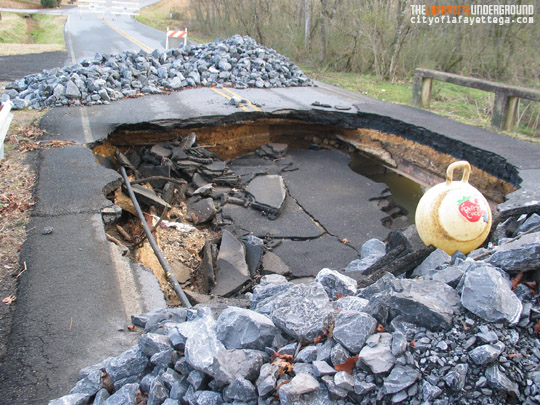
LU: At one point Georgia’s roads were considered to be among the nation’s best. In recent years state and (especially) local roads have deteriorated, and new construction projects have become rare. Various funding plans like TSPLOST, SPLOST, and LARP have popped up over the years with various levels of acceptance and limited success. What would you do as a State Representative to bring all Georgia roads back to a higher standard?
Florence: Maintaining our transportation infrastructure is a one of the things government should actually be doing. Far too often they stray into other areas and inevitably fall short in handling what they are responsible for. We see this with transportation. State Government must take a hard look at our transportation system and our taxation system that is supposed to support it. Changes are going to have to be made, but I think that can be done without increasing the size and scope of Government, and without increasing the tax burden.
Tarvin: Maintaining roads is one of the few things that government should do or see that it is done. It is fairly simple, priorities. We are headed into times that current Americans have never seen, we have found ourselves in a world market with nothing to sell. We do not make products to sell, we are a service nation. We will be doing more with less for a long time to come, we must bring manufacturing jobs back to America. With manufacturing jobs come increased revenues and prosperity for the American worker. With increased revenues and prosperity comes the repair of infrastructure.
A suggested first step to fixing roads would be requiring money collected for a specific purpose (like road repairs or tire recycling) actually be used FOR that purpose. The state gas tax, collected for half a century and meant for road work, goes into the state’s general budget where it’s wasted along with other funds instead of being used how it should be.
Having more jobs would help revenues for road repairs but it’s hard to attract more businesses to the area when infrastructure is falling apart. Chicken and egg situation – if we wait for both we’ll never get either.
LU: What personal beliefs, philosophy, or other criteria will you use when deciding what legislation to support or oppose?
Florence: I like to use a 5 way test employed by our Congressman, Tom Graves.
• Is it constitutional?
• Does it reduce the size and scope of Government?
• Does it lessen the tax burden?
• Does it promote personal responsibility?
• Does it promote liberty and justice for all?
Tarvin: It is constitutional and do I have the authority to act.
What is the problem we are trying to fix and does this action actually fix the problem.
What could the unintended consequence be and what else will this affect.
How much does it cost and how is it paid for.
Does increase government’s size.
LU: What sets you apart as the BEST candidate to represent House District 2? Why, in general, do you deserve voter support???
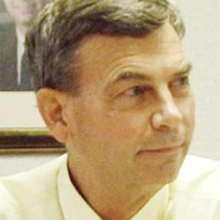 Florence: I believe you need to look at a candidate’s record; both in the private and public sectors to determine how they will lead if elected.
Florence: I believe you need to look at a candidate’s record; both in the private and public sectors to determine how they will lead if elected.
• I have been a successful business owner for 34 years and I have created jobs right here in the 2nd District. I know all about meeting budgets and payrolls.
• I have faithfully served as Mayor of LaFayette for over two decades and believe my record of service stands on its own. I was actually retiring from public life when this position opened up and I felt called to offer myself for service in this capacity.
Tarvin: A common sense problem solving businessman with decades of being considered a national leader in my industry, along with my employees successfully operating a $20M dollar business and meeting a $4M payroll consistently in a dying industry, watching the number of print machines decline from over two hundred to less than twenty in our type of printing, repositioning and redirecting the business multiple times and becoming an industry leader and innovator with each and every change of direction. Having the knowledge of when it was time to say when without losing the money of the investors.
Over four decades of being an ethical and morally correct businessman, being known as a man that my word is my bond, no contract was ever signed by me with any one while doing over a half billion dollars in business, on a hand shake alone. Never filing an insurance claim against anyone, never filing a claim with a truck line, never failing to pay one invoice we owed and never having any form of litigation or suit filed against our company including any type of wrongful discharge or claim from an employee.
Four decades of being a community leader, being very involved with the youth of the area. Being part of a making our town one of the best places to live in Northwest Georgia.
These qualities are the same qualities that I will use when representing the people of District 2, but the main reason you should vote for me is because my heart is the heart of the second district, my life is your life, I have been where you are and done what you have done.
LU: Is there anything else voters should know about you? Family, faith, philosophy, inspirations, etc.?
Florence: With me, what you see is what you get. I’m not flashy nor do I enjoy seeing my name in lights. I’m offering myself to continue serving the people and working to improve the community we call home. I humbly ask for your support.
Tarvin: I strongly believe in the people’s ability to govern themselves. I will absolutely never forget that you are my boss, the fact that I work for you and it is your money that I spend.
![]()
It’s difficult to choose a favorite in this race, because both men are so similar. Two 62-year-old white businessmen who both spent time in municipal government, who have same or similar positions on issues like gun control, taxation, and government transparency.
Going into this election, many in the district (including some in LaFayette) dismissed ex-Mayor Neal Florence as a political wannabe, an empty suit with no real positions on issues that matter. Some of his answers here ARE light in detail and he’s been hesitant to take a stand on some important topics. Florence’s out-of-district campaign funds also raise some concerns.
Tarvin, however, disagrees with many of his constituents about the honesty of elected leaders and takes a head-in-the-sand approach to ethical problems at the state and local level. Especially troubling is his dismissive response and attitude towards citizens about sole commissioner government. The last thing residents of LaFayette or south Walker County need is another state legislator from Chickamauga who thinks he knows what they want without asking.
For those reasons, LaFayette Underground cannot endorse either candidate for election in House District 2.
Thankfully the district get a do-over in three months. The winner of this seat will only serve for half the remaining legislative session and will surely face a primary opponent or ten in the upcoming May election. Regardless of who voters choose Tuesday, neither man will be in a position to do much harm – but being an incumbent will give the winner a slight advantage over any opponents in the next vote.
Only residents of House District 2, covering parts of Walker, Catoosa, and Whitfield, can vote in this race. To verify which district you live in and where you vote on Tuesday, visit the Georgia Secretary of State My Voter page.


